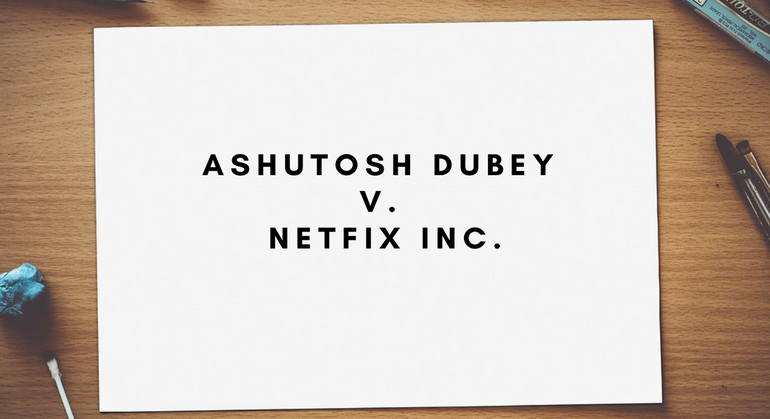

Ashutosh Dubey v. Netflix Inc.
The Plaintiff who is an advocate by profession filed a suit seeking an injunction against Netflix, the Defendants, from further streaming of the episodes of a Web-Series called ‘Hasmukh’ which airs on Netflix. The Plaintiff’s grievance stems certainly from Episode 4 of Season 1 of the Series and he argues that it comprises derogatory remarks, casts aspersions, brings disrepute to the legal community, and stigmatizes the image of lawyers amongst the public at large.
The Defendants argued that the Series was themed on satirical jokes and dark comedy where ‘Hasmukh’, the protagonist pursued a career in stand-up comedy on television shows. The Protagonist successfully performed his stand-up comedy act only after murdering evil and debauched persons whom he came across in his life. The Protagonist’s stand-up comedy act was based on satirical jokes made in relation to his murder victims. In line with this central theme, in the Episode, the Protagonist refers to ‘lawyers in Mumbai’, recording his harrowing experience with an aberrant lawyer. In this Episode, the Lawyer is portrayed as a dishonest, immoral, greedy, violent, terrorizing person who even duped the Protagonist into executing unfavorable contracts and coerced the Protagonist to pay fifty percent of the latter’s earnings from comedy performances on an ongoing basis.
In view of the above theme of the Series, Netflix argued that lawyers cannot be defamed as a class of persons as the imputation against such a collection of persons cannot be attributed to a small determinate body or a particular set of persons whose identity could be established. They argued that the Plaintiff had failed to show any prima facie case, which necessarily must be proved for permitting any interim relief. Moreover, the Plaintiff had failed to show any cause of action in terms of personal injury or violation or irreparable loss or of any right entitling him to the grant of an injunction.
Issue
The main issue in the present case was regarding the defamation, caused due to some derogatory remarks made by the protagonist in a web-series known as “Hasmukh".
Judgment
The Court dismissed the Plaintiff’s application without granting any interim relief. The Court’s decision was based on two issues, firstly, that Lawyers as a class are not capable of being defamed and secondly the Series was a satirical comment, a work of art which exaggerated different issues to expose the shortcomings of the profession. In denying the Plaintiff’s application, the Court held that an interim injunction in favor of the Plaintiff would be tantamount to interference with freedom of speech and expression, a right guaranteed under Article 19(1)(a) of the Constitution of India.
The Court based its decision on the settled legal position adopted by the different courts across India and outside. As per the Asha Parekh and Ors. v. The State of Bihar and Ors. 1977 Cri L J 21, any collective defamation must be against a “small determinate body.” Further, “however reprehensible and morally unjustifiable the words complained of maybe, for it to be actionable, it must comprise of an imputation concerning some particular person or persons whose identity can be established.” The legal community is an “amorphous and indeterminate body” and thus, lawyers taken as a class cannot be identified with any ‘particular’ individual. Hence, lawyers as a class are incapable of being defamed.
The Court observed that the Series was based on a theme of ‘satirical comedy’ where the Protagonist, a stand-up comedian, exaggerated different fact scenarios or issues to portray ills and evils of the community. When seen in the backdrop of satirical comedy that the Series fosters, it is evident that the Episode was a work of fiction that portrayed the hardships that the Protagonist suffered at the hands of the Lawyer. The remarks made by the Protagonist were a result of his personal experience with a greedy and dishonest lawyer. The remarks made in the Episode were against lawyers as a class in general and the same was not targeted against any determinate or identifiable group of lawyers. The Court held that the Protagonist ‘prima facie appeared to be exaggerating the issue for the purpose of highlighting the ills of the profession.’ The Court also reasoned that “one of the satirical techniques to criticize a particular subject or character is to exaggerate it beyond normal bounds so that it becomes ridiculous and its faults can be seen.” Satire, as a work of art, is a “witty, ironic and often exaggerated portrayal of a subject.”
The Court held that an interim injunction would interfere with the freedom of speech and expression of the Defendants which is guaranteed by the Constitution of India. The Court stressed that the ‘very essence of democracy lies in the fact that its creative artists are given the liberty to project the picture of the profession in any manner, including by using satire, to exaggerate the ills to an extent that it becomes ridicule.’
In this case, the Plaintiff had failed to show that the Episode in any way referred to the Plaintiff or any definite group of lawyers. In the absence of any injury caused to the Plaintiff, the fundamental principles for grant of interim relief under Order XXXIX Rule 1 and 2 of the Code of Civil Procedure, 1908 remained dissatisfied. The Plaintiff further failed to establish a prima facie case in its favor to show that irreparable injury would be caused to the Plaintiff, in the event the Court denied the grant of interim relief. In view of this, the Court dismissed the Plaintiff’s application seeking an interim injunction.



